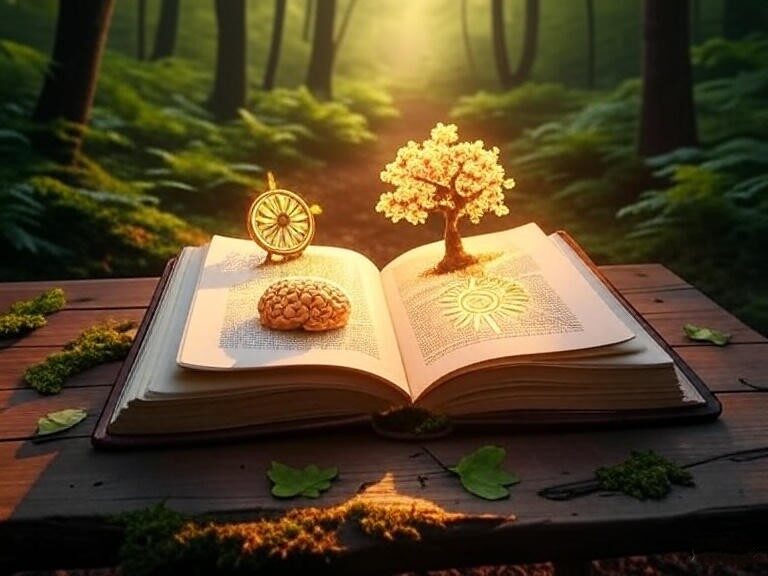You know that feeling. You close a book, but the room feels different. The air hums. Your thoughts, previously chattering monkeys, have fallen into a profound, almost unnerving silence. Something has shifted. It wasn’t just information absorbed; it was a lens ground to a new prescription, a foundation stone quietly replaced. These are the life-altering books. They do not change; they whisper it, echoing in chambers for a long time after the final page. It is not about escapism; this confrontation and clarity eventually grow into a type. It’s the slow burn of “Read, Reflect, Rise.”
Think about it. Reading is the easy part. We devour words daily—news feeds, emails, tweets. But reading a book that alters you? That’s an act of vulnerability. You surrender your time, your attention, and crucially, your current worldview. You invite a stranger’s mind, sometimes separated by centuries or continents, into your own. You open the door and say, “Change me.”

Then comes the Reflect. This is where the magic curdles, or crystallizes. It’s not passive. It’s the walk taken after finishing a chapter, staring unseeingly out the window. It’s the journal entry scribbled at 2 AM, ink blotted with something more than just words. It’s the argument you have with the author in your head, the uncomfortable squirm when their truth exposes a shadow in your own life. Reflection is the digestion of the feast. This is the place where Victor Frankl’s rigid yet searching quest for the shiny man’s discovery is only a Holocaust memoir and becomes a scalpel that dissects your reactions for the victim and your discovery for the purpose in the worldly tempering of a Tuesday afternoon. “Everything can be taken from a man but one thing: the last of human freedoms—to choose one’s attitude in any given set of circumstances.” This is not just a quote; it is thrown down. Reflect: Do I live like that? Can I?
Or consider Yuval Noah Harari’s Sapiens: A Brief History of Humankind. Reading it feels like having the floor of reality pulled out from under you. Harari doesn’t just recount history; he dissolves it. Nations, money, human rights, even corporations—he reveals them as powerful, shared fictions. Necessary fictions, perhaps, but fictions nonetheless. The reflection this provokes isn’t comfortable. It forces you to question the very bedrock of your society, your career, and your values. What does it mean to live authentically when so much of the stage is built on collective imagination? The reflection isn’t about finding easy answers; it’s about learning to hold the questions, to see the scaffolding of your world, and perhaps choose which parts to truly believe in.
Then there are the books that act like mirrors held up to your blind spots. Don Miguel Ruiz’s The Four Agreements seems deceptively simple. Four principles: Be Impeccable With Your Word, Don’t Take Anything Personally, don’t Make Assumptions, and Always Do Your Best. Reading them feels almost obvious. Reflecting on them? That’s the earthquake. How often does my word poison myself or others? Why do I let a stranger’s frown ruin my day, taking it as a personal indictment? How many relationships are crumbling under the weight of unspoken assumptions I’ve welded into fact? The reflection here is intensely personal, often embarrassing, but ultimately liberating. It’s housekeeping for the soul. The “Rise” comes not in grand gestures, but in catching yourself before snapping, in choosing clarity over assumption, and in offering kindness even when your instinct is defensiveness. It’s rising above the automatic, conditioned self.
Rise is the natural, often messy, consequence of deep reflection. It’s not about becoming a different person overnight. It’s an unfolding. It’s the subtle shift in posture when facing adversity after absorbing Frankl’s lessons. It’s the newfound skepticism applied to grand societal narratives, born from Harari’s deconstruction. It’s the conscious effort to speak with integrity and release the burden of others’ opinions, practiced after Ruiz’s mirror was held up. Rising isn’t linear. Some days, you feel like you’ve levitated; others, you’re clinging to the cliff face by your fingernails. But the direction has changed. You are no longer quite the same person who opened that book.
Think of Tara Westover’s Educated. Reading her journey from an isolated, survivalist childhood to the hallowed halls of Cambridge is breathtaking. But the true alteration comes in the reflection: What are the invisible cages I was born into? What beliefs were handed to me, unquestioned? What price am I willing to pay for self-definition? The “Rise” for the reader isn’t about getting a PhD (though it might inspire that!), it’s about the courage to examine their origins, question inherited truths, and claim the right to their mind. It’s rising out of the soil you were planted in, even if the roots protest.

These life-altering books share a common thread: they don’t offer pat solutions or ten-step programs. They offer perspective. They crack open the door to a different way of seeing—seeing the world, seeing suffering, seeing yourself. The alteration happens in the quiet space between the author’s words and your own lived experience. It’s a conversation, sometimes an argument, that continues long after the book is shelved.
It’s also deeply personal. What shatters one person might barely ripple another. The next time the prose in the fire of James Baldwin may be a catalyst for the intensive awakening of a reader, while another can find her tectonic change in the natural world in meditation and devotion in Mary Oliver’s quiet poems. “Tell me what you plan to do with a wild and precious life,” Oliver asks. For some, this simple question, actually reflected, becomes a fulcrum for massive changes.
The “growth” facilitated by these books is not always loud or external. Sometimes, this is an internal fortification. Reading the hope of Rebecca Solnit in Dark does not magically cure the world’s problems, but it can reshape your relationship with disappointment and action. This helps you grow within the conflict; the results help to find flexibility and purpose even when it is uncertain. It’s a rise in spirit, in endurance.
So, how do you find these books? They often find you. Sometimes, it’s through a friend’s fervent recommendation, a chance quote stumbled upon, or simply the right book at the most exquisitely wrong (or right) time in your life. Be open. Be willing to be discomforted. Seek out voices that challenge, not just comfort. And when you find one that resonates, that makes the room feel different when you close it… Don’t rush to the next. Sit in the silence. Reflect in the hum. Allow the slow, sometimes imperceptible, rise to begin. Because the truest life-alterations aren’t announced with fanfare; they seep into your bones, page by page, reflection by reflection, lifting you, almost without you noticing, onto slightly higher ground. And from there, the view is always different.







+ There are no comments
Add yours